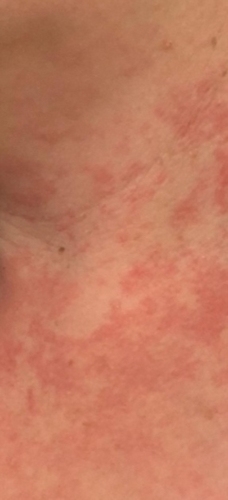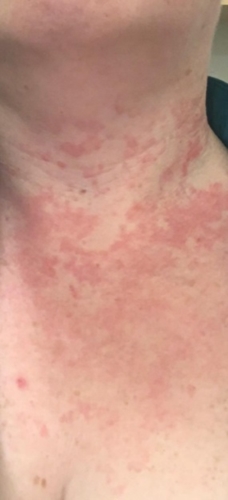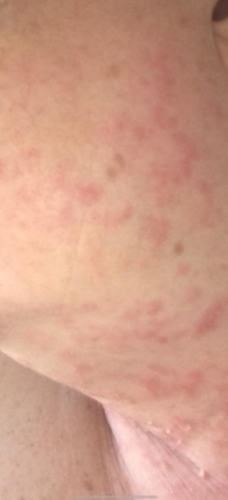Skin Rash - Advice Needed
Posted , 4 users are following.
I am trying to sign-up to some Dermatology Forums, for a friend, in a hope to get a rough diagnosis as She keeps getting a terrible rash on her face, neck and upper chest. She complains that its very itchy, hot to the touch and painful (like a stinging Nettle feel).
I have attached three photos but She needs advice on what is best as she is struggling to get any appointment with her GP and it is really affecting her.
What can She do?
0 likes, 3 replies



clair15856 Wesley2014
Posted
Rash: Care Instructions
Wash the area with water only. ...
Put cold, wet cloths on the rash to reduce itching.
Keep cool, and stay out of the sun.
Leave the rash open to the air as much of the time as possible.
Sometimes petroleum jelly (Vaseline) can help relieve the discomfort caused by a rash.
Naomi-04 Wesley2014
Edited
There are only 2 simple ways to identify the cause of a rash that is super itchy:
If the rash happens after putting something on the skin - it can be skin disorder, you might be allergic to it. One thing to do it to stay away or stop using that substance to skin. Cold water helps circulation on the area that could help ease the itchiness and healing of redness.
If the rash happens suddenly even without putting something on skin - it has something to do with liver problem. There might be a fatty liver or any obstruction in the liver pathway. The best way to do is to check on your diet. Does she eating lots of unhealthy fatty food and refined carbohydrates? These really affect liver. Ice cream, cheese, milk are hard to digest food that overburden your liver. So eliminate these on her diet.
These rashes and itchiness will just slowly disappear if she would eliminate food from her diet that badly affects her liver. Crackers and deep fry foods also are bad to liver.
Another thing, Rashes on the neck, face and chest could be close to signs of fatty liver.
Check more about Fatty liver and you'll find these signs are really close to her condition.
nikhilmehta Wesley2014
Posted
Typically, it takes from 12 hours to 3 days. Even with treatment, symptoms can last 2 to 4 weeks. Hives. These are raised, itchy red welts or bumps